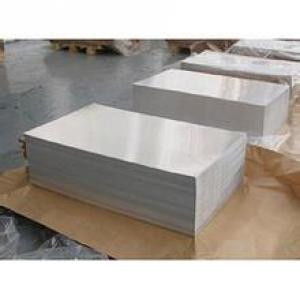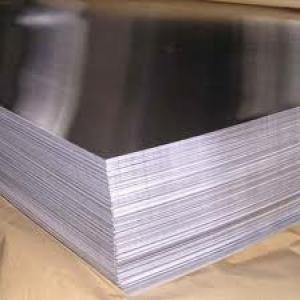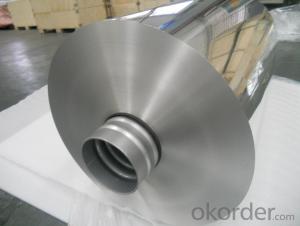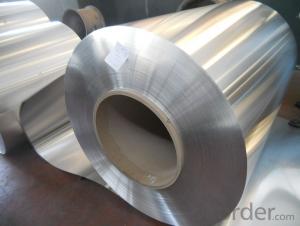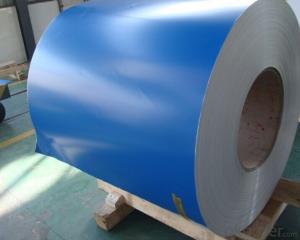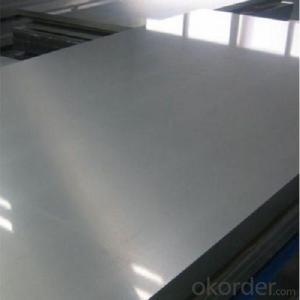ALUMINUM SHEET 1050PS LITHO SHEET STOCK CTP CTP CTOCK
- Loading Port:
- Ningbo
- Payment Terms:
- TT or LC
- Min Order Qty:
- 1 m.t.
- Supply Capability:
- 500000 m.t./month
OKorder Service Pledge
OKorder Financial Service
You Might Also Like
| 1XXX SERIES | 1050PS LITHO SHEET STOCK CTP CTP CTOCK | PRITING | H18 H16 | 0.14—0.27 |
| 1050 1060 1060 1070 1100 ANODIZING STOCK DEEP DRAW STOCK | COSMETIC CAP STOCK CAP STOCK ALUMINUM CIRCLE STOCK ACP STOCK TREAD PLATE SPECULAR SHEET CABINET SHEET LIGHTING COMPONENT STOCK CAPACITOR SHELL STOCK | ALL TEMPERS | 0.2—4.5 | |
| 1A99 1070 1235、1100 FOIL AND FOIL STOCK | CAPACITOR FOIL,HOUSEHOLD FOIL, FOIL STOCK | H14 H18 | 0.02—0.3 |
Aluminum Sheet (Plate) is availble in various alloys offering a range of weldability, corrosion resistance and machinability. High strength Aluminum Sheet, such as 7075, can be used in aerospace applications, and high corrosion resistance aluminum alloy sheets are commonly used in marine applications.
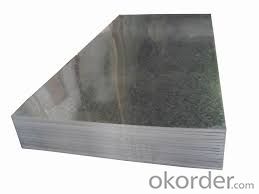
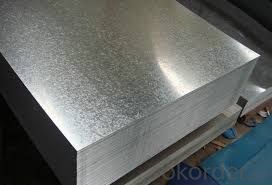
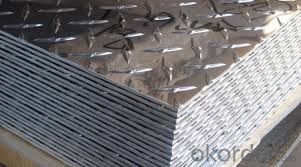
5052-H32 Aluminum Sheet - (ASTM B209, QQ-A-250/8) Superior corrosion resistance, good weldability, with excellent formability, makes 5052 Aluminum Sheet a common choice for chemical, marine or saltwater applications. 5052 Aluminum Sheet applications include: tanks, marine hardware, boat hulls, etc.
Non-magnetic, Brinell = 60, Tensile = 33,000, Yield = 28,000 (+/-)
6061-T651 Aluminum Sheet - (ASTM B209, QQ-A-250/11) Offers a combination of increased strength, corrosion resistance, and machinability making it the most widely used aluminum grade. 6061 Aluminum Sheet is heat treatable, resists cracking due to stress, is easy to weld and machine, but limited on formability. 6061 Aluminum Sheet is ideal for structural framing, base plates, gussetts, motorcycle & automotive parts, etc.
Non-magnetic, Brinell = 95, Tensile = 45,000, Yield = 40,000 (+/-)
- Q:Are aluminum sheets suitable for food processing conveyor systems?
- Aluminum sheets are a great choice for food processing conveyor systems as they offer several advantages. Firstly, they are lightweight yet strong, making them perfect for conveyor systems that require frequent movement and transportation of food products. Their lightweight nature allows for easy installation, maintenance, and modification of conveyor systems, while their strength ensures the equipment's durability and longevity. Secondly, aluminum is corrosion-resistant, which is crucial in food processing environments where exposure to moisture, chemicals, and food acids is common. This resistance to corrosion ensures that the conveyor system remains hygienic and free from contamination, meeting the industry's strict food safety standards. Furthermore, aluminum is non-toxic, making it a safe material for food handling and contact. It does not react with food or release any harmful substances, ensuring the integrity and safety of the food being processed on the conveyor system. Moreover, aluminum is easy to clean and maintain, which is essential in food processing environments where hygiene is of utmost importance. The smooth and non-porous surface of aluminum sheets allows for easy removal of food particles, grease, and other contaminants, reducing the risk of bacterial growth and cross-contamination. In conclusion, aluminum sheets are highly suitable for food processing conveyor systems due to their lightweight, corrosion-resistant, non-toxic, and easy-to-clean properties. They provide a reliable and efficient means of transporting food products while ensuring the highest standards of hygiene and food safety.
- Q:What are the weight and density of aluminum sheets?
- The thickness and dimensions of aluminum sheets determine their weight and density. In general, aluminum has a density of approximately 2.7 g/cm³ or 2700 kg/m³. To calculate the weight, you can multiply the density by the volume of the sheet. For instance, if you have a 1-meter by 1-meter sheet that is 1 millimeter thick, the volume would be 0.001 cubic meters (1 meter x 1 meter x 0.001 meter). By multiplying this volume by the density of aluminum, you would find that the weight of the sheet is 2.7 kilograms (0.001 cubic meters x 2700 kg/m³). Keep in mind that these values may vary depending on the specific dimensions and thickness of the aluminum sheet.
- Q:Can aluminum sheets be used for wall cladding?
- Indeed, wall cladding can utilize aluminum sheets. The lightweight quality, durability, and resistance to corrosion make aluminum a favored option for cladding materials. It is frequently employed in both commercial and residential constructions to enhance the external appearance of a structure with an appealing and contemporary aesthetic. The malleability and ease of fabrication of aluminum sheets enable the creation of diverse shapes and sizes, facilitating flexible design possibilities. Furthermore, aluminum cladding demands minimal maintenance, necessitating only sporadic cleaning and upkeep. In summary, aluminum sheets are a versatile and pragmatic selection for wall cladding.
- Q:are there any carbonated mineral water that are produced in aluminium cans.
- Aluminium cans have an oxide covering on them so the reaction between them and the carbonated water is so little if any that it can't be noticed. Aluminium is also not so high on the reactivity series
- Q:Can aluminum sheets be embossed?
- Indeed, it is possible to emboss aluminum sheets. The act of embossing entails producing a design that is elevated or inset on the surface of a material. Aluminum is a versatile substance that can be easily manipulated, including being subjected to embossing. One can employ different techniques in order to emboss aluminum sheets, such as heat embossing or using tools and machines specifically designed for embossing. By undergoing the embossing process, the aluminum sheets gain texture and depth, resulting in an enhanced appearance suitable for a wide range of applications. These applications may include decorative purposes, signage, nameplates, and even the addition of texture to automotive or architectural accents.
- Q:What are the different alloys available for aluminum sheets?
- There are several different alloys available for aluminum sheets, each with its own unique properties and applications. Some of the most common alloys include: 1. 1100: This is a commercially pure aluminum alloy with excellent corrosion resistance, making it suitable for applications where high levels of corrosion resistance are required, such as in marine environments. 2. 3003: Another commercially pure alloy, 3003 offers good formability, high corrosion resistance, and moderate strength. It is commonly used for general sheet metal work, cooking utensils, and chemical equipment. 3. 5052: This alloy is known for its high fatigue strength and excellent corrosion resistance, particularly in saltwater environments. It is often used in marine applications, as well as for aircraft components and fuel tanks. 4. 6061: A heat-treatable alloy, 6061 exhibits good weldability and formability, along with high strength and excellent corrosion resistance. It is commonly used in structural components, such as frames and railings, as well as automotive parts. 5. 7075: This alloy is known for its high strength-to-weight ratio, making it ideal for aerospace applications and high-stress structural components. However, it is less corrosion resistant than other alloys and may require protective coatings in certain environments. These are just a few examples of the alloys available for aluminum sheets. The choice of alloy will depend on the specific requirements of the application, such as strength, corrosion resistance, formability, and cost. It is important to consult with a knowledgeable supplier or engineer to determine the most suitable alloy for your specific needs.
- Q:What is the typical shear strength of aluminum sheets?
- The shear strength of aluminum sheets can vary depending on several factors, including the alloy, temper, thickness, and manufacturing process. Typically, common aluminum alloys have a shear strength ranging from 207 to 310 megapascals (MPa) or 30,000 to 45,000 pounds per square inch (psi). It is crucial to understand that these values serve as general guidelines, and specific applications and conditions may result in variations. When dealing with critical applications, it is advisable to refer to the material specifications or consult professionals to accurately determine the shear strength requirements for the specific aluminum sheet in use.
- Q:Can 101 aluminum sheets be anodized for medical equipment applications?
- Medical equipment applications can involve anodizing 101 aluminum sheets, which creates a protective layer on the surface of the aluminum. This process enhances corrosion resistance, durability, and the overall aesthetic appearance. Anodizing is commonly used in the medical industry to improve equipment performance and longevity, as well as to maintain cleanliness and sterility. The specific alloy, such as 101, does not typically affect the anodizing process, as it can be applied to various grades of aluminum. However, it is crucial to consult with an anodizing specialist or manufacturer to ensure that the specific alloy is suitable for the intended medical equipment application and to determine the most appropriate anodizing process and specifications.
- Q:Can aluminum sheets be used for signage purposes?
- Indeed, signage purposes can be fulfilled by utilizing aluminum sheets. The signage industry often relies on aluminum, a highly adaptable and enduring material. Renowned for its lightweight nature, corrosion resistance, and exceptional weather resilience, aluminum is an ideal choice for both indoor and outdoor signage. By effortlessly cutting and molding aluminum sheets, one can fashion diverse sizes and designs for signs. These sheets can be painted, coated, or printed upon to exhibit logos, text, or graphics. Moreover, aluminum signs are economically advantageous and possess a prolonged lifespan, rendering them a favored option for businesses, construction sites, road signs, and various other signage applications.
- Q:Are aluminum sheets suitable for automotive applications?
- Yes, aluminum sheets are suitable for automotive applications. They are lightweight, corrosion-resistant, and offer excellent strength-to-weight ratio, making them ideal for various components in vehicles such as body panels, hoods, doors, and engine parts.
1. Manufacturer Overview |
|
|---|---|
| Location | |
| Year Established | |
| Annual Output Value | |
| Main Markets | |
| Company Certifications | |
2. Manufacturer Certificates |
|
|---|---|
| a) Certification Name | |
| Range | |
| Reference | |
| Validity Period | |
3. Manufacturer Capability |
|
|---|---|
| a)Trade Capacity | |
| Nearest Port | |
| Export Percentage | |
| No.of Employees in Trade Department | |
| Language Spoken: | |
| b)Factory Information | |
| Factory Size: | |
| No. of Production Lines | |
| Contract Manufacturing | |
| Product Price Range | |
Send your message to us
ALUMINUM SHEET 1050PS LITHO SHEET STOCK CTP CTP CTOCK
- Loading Port:
- Ningbo
- Payment Terms:
- TT or LC
- Min Order Qty:
- 1 m.t.
- Supply Capability:
- 500000 m.t./month
OKorder Service Pledge
OKorder Financial Service
Similar products
New products
Hot products
Hot Searches
Related keywords
